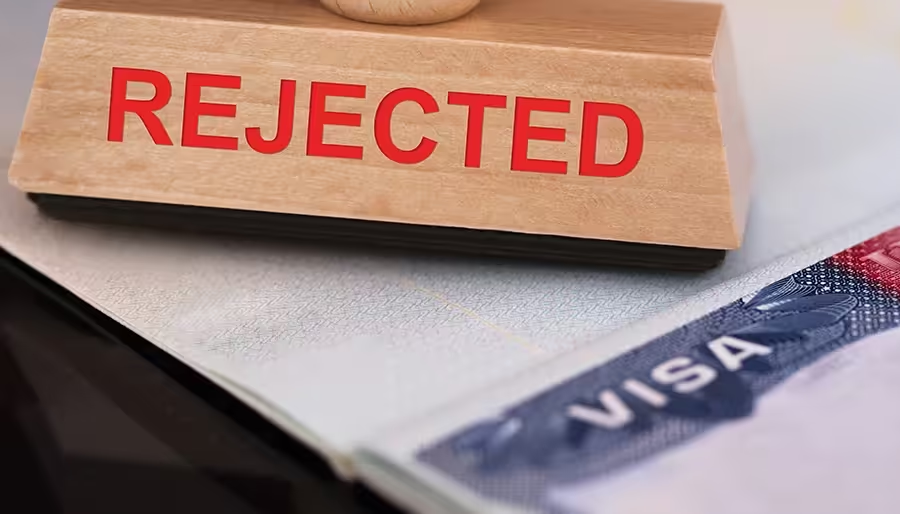Common Student Visa Refusal Reasons and How to Avoid Them

Applying for a student visa is a major step toward studying abroad. However, it also tends to be one of the most stressful steps. If you understand the student visa refusal reasons, it can dramatically improve your chances of success.
This guide is going to assist you significantly in that matter. It breaks down the common student visa rejection reasons, explains why student visa gets rejected, and offers practical and proven steps on how to avoid student visa refusal. The information in this guide is backed by current Australian policy and official guidance.
Note: Australia introduced the Genuine Student Test (GST) requirement in March 2024 (replacing the older GTE), and financial-capacity thresholds have also changed in recent updates. Always double-check official Home Affairs guidance as you prepare your application.
Now let’s throw some light on the prime reasons behind student visa refusal and how you can avoid them.
1. Incomplete Or Inconsistent Documentation
One of the most common student visa rejection reasons is simply missing or inconsistent paperwork. If documents don’t match (names, dates, course details, or passport information), immigration officers may consider the file unreliable and refuse the visa.
How to avoid it:
- Use a complete checklist and only upload clear and legible scans.
- Ensure names, dates, course codes, and contact details are identical across your offer letter, passport, and application.
- Translate any non-English documents with certified translations.
This simple and basic step prevents a surprisingly large share of refusals.
2. Weak Genuine Student Test (GST) Evidence (formerly GTE issues)
Australia’s move from the Genuine Temporary Entrant (GTE) to the Genuine Student Test (GST) requirement has tightened scrutiny on applicants’ study intent. Officers now ask targeted questions about your education history, the reasons for choosing your course and institution, and your ties to your home country. If your statement is vague or appears copied, it significantly increases the student visa denial reasons.
How to avoid it:
- Write a clear and personalised statement explaining why the course is necessary now, how it builds on past studies/work, and how it fits your future career. You must avoid templates for doing so.
- Demonstrate knowledge of the course and the institution’s unique benefits.
- Be consistent in your GST statement. It must align with your other documents (financials, employment letters, and academic records).
3. Insufficient Financial Evidence
Changes to living-cost thresholds and proof requirements have been prominent in 2024–2025 updates. You must show that you can support your tuition and living costs (official guidance lists amounts and acceptable forms of proof such as bank statements, sponsor letters, or income evidence). Failing to prove funds is a leading reason for student visa rejection and solutions for it always involve better financial documentation.
How to avoid it:
- Provide bank statements with clear and sustained balances or credible sponsor documents.
- Include evidence of tuition payments or loans where applicable.
- Explain any large deposits in a covering letter with supporting bank or loan documents.
4. Course and Career Mismatch
If your chosen course doesn’t logically follow your prior education or professional experience, an officer may conclude your application lacks a genuine academic purpose. This is a common mistake in student visa application assessments.
How to avoid it:
- You must explain the academic progression. It will include information regarding how your prior studies/work led to this course.
- Share a short career plan showing how the qualification will be used in your home country (job roles, industry demand, planned employers).
- Use concrete evidence such as job advertisements, employer letters, or industry reports if relevant.
5. False or Misleading Information
Submitting fabricated documents or overstated credentials is a quick path to refusal and potentially long-term bans. A key reason why student visas get rejected is the presence of inconsistencies or misleading information in the application, which raises credibility concerns.
How to avoid it:
- Only submit genuine documents. If something looks weak, explain it honestly in a covering letter.
- If you made a mistake in a prior application, disclose it proactively and attach supporting proof.
6. Weak Supporting Proof Of Ties To Home Country
Visa officers must be satisfied and confident that you intend to return to your home country after completing your studies. If you don’t convincingly show family, employment, or property ties, your application risks being labelled as a migration intent rather than a student visa application. This is a common student visa refusal reason.
How to avoid it:
- Provide employment contracts, property deeds, family proof, or evidence of ongoing commitments.
- If you plan to return to a specific job, attach an employer letter confirming a leave of absence.
- Include community or family responsibilities in your statement.
7. Poor English or Academic Documentation
Incorrect or expired test scores (IELTS, PTE) and weak academic records can lead to rejections. Admissions offers must reflect the required English levels and prerequisites.
How to avoid it:
- Submit valid and up-to-date English test results and transcripts.
- If you have conditional offers, clearly show how conditions will be met.
- If applicable, explain gaps in education or work with documents (e.g., medical records, employment proof).
8. Previous Visa Refusals Or Migration History Concerns
If you’ve been refused a visa before and haven’t explained the reasons and resolutions, your current applications often face greater scrutiny. Past history is a significant factor in student visa denial reasons.
How to avoid it:
- Attach a clear and factual statement explaining past refusals and how circumstances have changed.
- Provide any relevant document(s) that address the prior concerns.
9. Student Visa Interview Mistakes
If you’re called for an interview, nervous or inconsistent answers can harm your application. While interviews aren’t always mandatory, they’re decisive when they occur.
How to avoid it:
- You must prepare well. You must have clear ideas and answers related to your course details, finances, and return plans.
- Be honest and concise. Practice common questions with a friend or counsellor.
- Keep documents organised so you can quickly reference them.
10. Health or Character Concerns
Failing health checks or having disclosable criminal records can cause visa refusals under Australian immigration rules.
How to avoid it:
- Complete required health checks promptly and disclose any relevant medical history honestly.
- Provide police clearances where required and explain any past incidents.
Practical Next Steps If Your Student Visa Is Refused
- Read the refusal letter carefully. It lists the legal reasons for refusal.
- You must assess appeal rights. Some refusals may be reviewable by a tribunal (time limits apply). Seek legal or migration advice early.
- Correct and reapply if no appeal is possible. Address each reason with stronger documentation.
- Consider seeking expert help. A migration agent or legal adviser can identify weaknesses and help reframe your application.
Final Checklist: How To Avoid Student Visa Refusal
You can rely on the final checklist mentioned below to avoid student visa refusal:-
- Complete and consistent documents
- Strong and personalised Genuine Student Test statement
- Clear financial proof meeting current thresholds
- Logical course-to-career narrative
- Honest disclosure of past visa or legal issues
- Professional proofreading and expert review
Official resources (DoHA/Study Australia) are the best places to confirm current thresholds and requirements before you apply.
If your visa has already been refused while you are in Australia, you don’t need to panic. You can explore our guide on How to Appeal for Visa Refusal to understand the Visa Refusal Appeal process and your next steps.
Final Words
Getting a student visa approved is about planning, honesty, and clear documentation. If you want to avoid student visa rejection and file a confident and compliant application, professional support can indeed make a huge difference.
Visa Empire offers tailored guidance to fix weak spots, prepare your Genuine Student Test statement, and ensure your application meets the latest immigration requirements in Australia. If you’re aiming to study overseas, don’t leave your future to chance.
Reach out to Visa Empire. We are the best student visa agents in Brisbane. Our experienced team will assist you significantly in increasing your chances of visa approval.
Contact Us Today!!!
Frequently Asked Questions (FAQs)
1. What are the reasons for student visa rejection in Australia?
Australian student visas may be rejected if the applicant fails to meet key requirements such as providing complete and genuine documents, proving financial capacity, submitting a strong Genuine Student Test (GST) statement, or demonstrating clear study and career intentions. Other reasons include weak English language evidence, inconsistent information, lack of ties to the home country, or past visa refusal history.
2. How often do Australian student visas get rejected?
Student visa refusal rates vary depending on applicant profiles, documentation strength, country of application, and recent visa policy changes. While thousands of students successfully obtain visas each year, applications with weak financial proof, unclear study purpose, or inconsistent information are more likely to face rejection. A well-prepared application significantly improves approval chances.
3. How can I avoid student visa rejection?
To avoid student visa rejection, ensure your application is complete, accurate, and backed by strong evidence. Provide genuine documents, maintain transparency, and submit a compelling Genuine Student Test statement. Show proof of funds, academic readiness, and clear future goals that align with your chosen course. Professional migration guidance can also help you prepare a strong, compliant application.
4. How to avoid Australia visa rejection?
To avoid an Australia visa rejection, prepare your application with attention to detail, follow official guidelines, and ensure all documentation meets the visa criteria. Avoid errors, maintain consistency across forms, and provide honest explanations for any academic or financial gaps. Demonstrating genuine intent and presenting well-organised documents boosts approval chances.
5. What is the main reason for visa refusal in Australia?
The most common reason for visa refusal in Australia is insufficient evidence of genuine intent. It means the officer is not convinced the applicant truly plans to study and return home after completing their course. Other strong contributing factors include lack of financial proof, incomplete paperwork, and inconsistent information in the application.



